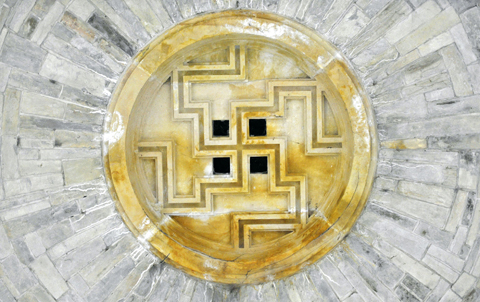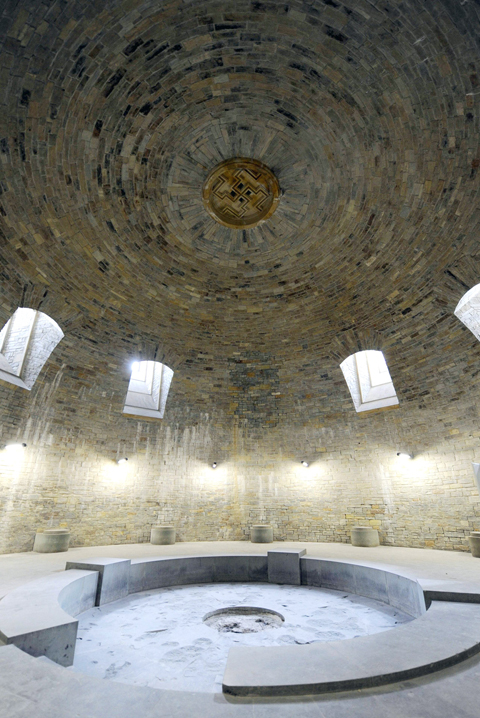Housed in a mysterious castle designed to be the spiritual home of the Nazi global empire after World War II, a museum devoted to Adolf Hitler’s murderous SS opened on Thursday last week.
The 7 million euro (US$10 million) museum, dubbed the world’s first dedicated entirely to the SS, charts its growth from Hitler’s elite guard to a band of more than 1 million men who committed unspeakable crimes across Europe.
Among previously unseen items is SS leader Heinrich Himmler’s diary, showing visits to the castle planned in his spidery script, as well as uniforms and devices used to test whether officers were “Aryan” enough.

PHOTO: AFP
Also included with the 1,000 pieces on show are two “death’s head rings,” silver bands engraved with Himmler’s signature given to senior officers, with a skull, swastika and the Sig Rune, the instantly recognizable SS symbol.
Wewelsburg Castle, an imposing 17th century triangular edifice on a hilltop south of Hanover in central Germany, itself played a pivotal role in SS history.
Himmler took out a 100-year lease on the castle in 1934, just after Hitler’s Nazi party came to power, and intended to transform it into a training school for elite SS officers.

PHOTO: AFP
Later he developed more ambitious plans to take over the surrounding village and build an SS capital city with the castle at “the center of the new world” after the “final victory.”
Wewelsburg hosted meetings of top SS generals, including a key rendezvous in June 1941 on the eve of the invasion of Russia where Himmler told the assembled Nazis the goal was “to kill 30 million Slavs.”
Himmler ordered bizarre renovations to the castle, creating a spooky circular crypt with a gas pipe in the floor for an eternal flame, a Nazi swastika in the ceiling and 12 pedestals at even intervals around the walls.
This room has given rise to a host of myths about Wewelsburg, that it was conceived as “Himmler’s Camelot,” designed to hold meetings with his 12 top generals as King Arthur once convened the Knights of the Round Table.
Moritz Pfeiffer, a 27-year-old historian who helped design the permanent exhibition, said torch-bearing SS guards or statues probably stood on the pedestals, but he scotched the myth that Himmler conducted bizarre pagan rituals in the echoing crypt.
“That can’t be scientifically proven. We know the number 12 crops up time and again in the castle, but we can’t say exactly what that means,” he said.
Directly above the crypt is the “Hall of the Supreme SS Leaders,” another circular room supported by 12 stone pillars with a mysterious occult symbol known as the “schwarze Sonne” or “black sun” set in the floor.
The symbol, a dark circle with 12 crooked “spokes” making up the “sun,” has baffled historians and fascinated neo-Nazis who have adopted it as an alternative sign to the swastika, which is banned in Germany.
Indeed, the castle has become a magnet for neo-Nazis and authorities are aware the new museum could attract unwanted attention from the far-right.
“We had people coming to the castle and performing the Hitler salute. You can only deflect this way of thinking if you show where it leads,” said Heinz Koehler, the deputy head of the local administration. “We reserve the right to throw people out.”
Among those expected to attend the opening was 104-year-old Leopold Engleitner, an Austrian survivor of the concentration camp near the castle where 3,900 people were held. One third of the inmates died.
The museum commemorates victims of the camp, including Guenter Ransenberg, a 15-year-old Jewish boy who accidentally hit the daughter of an SS officer during a friendly snowball fight.
He was hanged for “racial crimes.”

The CIA has a message for Chinese government officials worried about their place in Chinese President Xi Jinping’s (習近平) government: Come work with us. The agency released two Mandarin-language videos on social media on Thursday inviting disgruntled officials to contact the CIA. The recruitment videos posted on YouTube and X racked up more than 5 million views combined in their first day. The outreach comes as CIA Director John Ratcliffe has vowed to boost the agency’s use of intelligence from human sources and its focus on China, which has recently targeted US officials with its own espionage operations. The videos are “aimed at

STEADFAST FRIEND: The bills encourage increased Taiwan-US engagement and address China’s distortion of UN Resolution 2758 to isolate Taiwan internationally The Presidential Office yesterday thanked the US House of Representatives for unanimously passing two Taiwan-related bills highlighting its solid support for Taiwan’s democracy and global participation, and for deepening bilateral relations. One of the bills, the Taiwan Assurance Implementation Act, requires the US Department of State to periodically review its guidelines for engagement with Taiwan, and report to the US Congress on the guidelines and plans to lift self-imposed limitations on US-Taiwan engagement. The other bill is the Taiwan International Solidarity Act, which clarifies that UN Resolution 2758 does not address the issue of the representation of Taiwan or its people in

US Indo-Pacific Commander Admiral Samuel Paparo on Friday expressed concern over the rate at which China is diversifying its military exercises, the Financial Times (FT) reported on Saturday. “The rates of change on the depth and breadth of their exercises is the one non-linear effect that I’ve seen in the last year that wakes me up at night or keeps me up at night,” Paparo was quoted by FT as saying while attending the annual Sedona Forum at the McCain Institute in Arizona. Paparo also expressed concern over the speed with which China was expanding its military. While the US

SHIFT: Taiwan’s better-than-expected first-quarter GDP and signs of weakness in the US have driven global capital back to emerging markets, the central bank head said The central bank yesterday blamed market speculation for the steep rise in the local currency, and urged exporters and financial institutions to stay calm and stop panic sell-offs to avoid hurting their own profitability. The nation’s top monetary policymaker said that it would step in, if necessary, to maintain order and stability in the foreign exchange market. The remarks came as the NT dollar yesterday closed up NT$0.919 to NT$30.145 against the US dollar in Taipei trading, after rising as high as NT$29.59 in intraday trading. The local currency has surged 5.85 percent against the greenback over the past two sessions, central